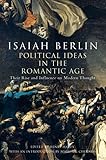Political ideas in the romantic age : their rise and influence on modern thought / Isaiah Berlin ; edited by Henry Hardy ; with an introduction by Joshua L. Cherniss.
Material type: TextPublication details: Princeton ; Oxford : Princeton University Press, 2006.Description: lx, 292 p. ; 25 cmISBN:
TextPublication details: Princeton ; Oxford : Princeton University Press, 2006.Description: lx, 292 p. ; 25 cmISBN: - 0691126879
- 9780691126876
- Their rise and influence on modern thought
- B 1618 B515p 2006
| Item type | Current library | Home library | Collection | Shelving location | Call number | Copy number | Status | Date due | Barcode |
|---|---|---|---|---|---|---|---|---|---|
 Libro
Libro
|
Biblioteca Juan Bosch | Biblioteca Juan Bosch | Humanidades | Humanidades (4to. Piso) | B 1618 B515p 2006 (Browse shelf(Opens below)) | 1 | Available | 00000085553 |
Browsing Biblioteca Juan Bosch shelves, Shelving location: Humanidades (4to. Piso), Collection: Humanidades Close shelf browser (Hides shelf browser)

|

|

|

|

|

|

|
||
| B 1618 B515p 1998 The proper study of mankind : an anthology of essays / | B 1618 B515p 2000 The proper study of mankind : an anthology of essays / | B 1618 B515p 2002 The power of ideas / | B 1618 B515p 2006 Political ideas in the romantic age : their rise and influence on modern thought / | B 1618 B515se 1998 The sense of reality : studies in ideas and their history / | B 1618 B515s 1998 El sentido de la realidad : sobre las ideas y su historia / | B 1618 B515s 2017 Sobre la libertad / |
"In the United Kingdom and European Union, published by Chatto & Windus in 2006"--T.p. verso.
Includes bibliographical references (p. lv-lx) and index.
Abbreviations and Conventions viii Editor's Preface ix Isaiah Berlin's Political Ideas: From the Twentieth Century to the Romantic Age Joshua L. Cherniss xxi Political Ideas in the Romantic Age Prologue 1 Chapter 1: Politics as a Descriptive Science 17 Chapter 2: The Idea of Freedom 88 Chapter 3: Two Concepts of Freedom: Romantic and Liberal 155 Chapter 4: The March of History 208 Appendix: Subjective versus Objective Ethics 260 Summaries of the Flexner Lectures 266 Note from the Editor to the Author 279 Index 285.
Presents an account of the renowned essayist, Isaiah Berlin's key insights about the history of ideas in the period that he made his own - the Romantic age. Distilling his formative early work in the history of ideas, this book was written for a series of lectures at Bryn Mawr College in 1952. It is sometimes thought that the renowned essayist Isaiah Berlin (1909-1997) was incapable of writing a big book. But in fact he developed some of his most important essays - including "Two Concepts of Liberty" and "Historical Inevitability" - from a book-length manuscript that he intended to publish, but later set aside. Published here for the first time, "Political Ideas in the Romantic Age" is the only book in which Berlin lays out in one continuous account most of his key insights about the history of ideas in the period that he made his own - the Romantic age. Distilling his formative early work in the history of ideas, the book also contains much that is not found elsewhere in his writings. The last of Berlin's posthumous books, it is of great interest both for his treatment of the subject and for what it reveals about his intellectual development. Written for a series of lectures at Bryn Mawr College in 1952, and heavily revised and expanded by Berlin afterward, the book argues that the political ideas of the Romantic age are still largely our own - down to the language and metaphors they are expressed in.
Vividly expounding the central political ideas of leading European thinkers in the period 1760-1830, including Helvetius, Condorcet, Rousseau, Saint-Simon, Hegel, Schelling, and Fichte, the book is written in Berlin's characteristically accessible style. The book has been carefully prepared by Berlin's longtime editor Henry Hardy, and Joshua L. Cherniss provides an illuminating introduction that sets it in the context of Berlin's life and work.


There are no comments on this title.